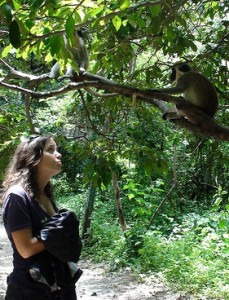This week we traveled from Nouachott, Mauritania to Dakar, Senegal. It seems unbelievable that our time in sub-Saharan Africa is about to take a small hiatus when we return to states for the World Food Prize‘s 2010 Borlaug Dialogue International Symposium in October. But our work never slows down, and we’ve spent the week meeting with farmers, international nonprofits, and reporters about on the ground innovation in environmentally sustainable agriculture.

Bijilo Forest Park Nature Trail in The Gambia (Photo credit: Bernard Pollack)
Check out this week’s innovation on a method to stop desertification in the Sahel. We also concluded our interview with Phil Bereano, Professor Emeritus in the field of Technology and Public Policy at the University of Washington in Seattle, as he told us about the ethical complexities of genetic engineering.

Danielle Nierenberg, an expert on livestock and sustainability, currently serves as Project Director of State of World 2011 for the Worldwatch Institute, a Washington, DC-based environmental think tank. Her knowledge of factory farming and its global spread and sustainable agriculture has been cited widely in the New York Times Magazine, the International Herald Tribune, the Washington Post, and
other publications.
Danielle worked for two years as a Peace Corps volunteer in the Dominican Republic. She is currently traveling across Africa looking at innovations that are working to alleviate hunger and poverty and blogging everyday at Worldwatch Institute’s Nourishing the Planet. She has a regular column with the Mail & Guardian, the Kansas City Star, and the Huffington Post and her writing was been featured in newspapers across Africa including the Cape Town Argus, the Zambia Daily Mail, Coast Week (Kenya), and other African publications. She holds an M.S. in agriculture, food, and environment from Tufts University and a B.A. in environmental policy from Monmouth College.








